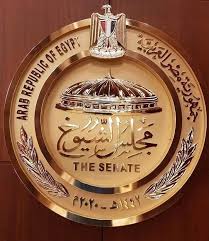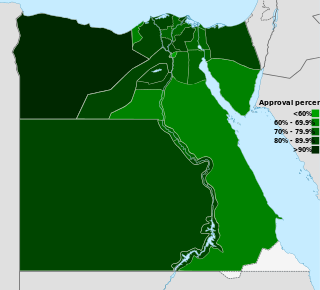
The politics of Egypt are based on republicanism, with a semi-presidential system of government. The current political system was established following the 2013 Egyptian Military coup d'état, and the takeover of President Abdel Fattah el-Sisi. In the current system, the President is elected for a six-year term. He can appoint up to 5 percent of the parliament. Furthermore, the President has the power to dissolve Parliament through Article 137. The Parliament of Egypt is the oldest legislative chamber in Africa and the Middle East. The unicameral Parliament has the ability to impeach the President through Article 161. With 2020 elections to the new Senate, the chamber became bicameral.

The Constitution of the Republic of China is the fifth and current constitution of the Republic of China (ROC), ratified by the Kuomintang during the Constituent National Assembly session on 25 December 1946, in Nanjing, and adopted on 25 December 1947. The constitution, along with its Additional Articles, remains effective in ROC-controlled territories.

The president of Egypt is the executive head of state of Egypt and the de facto appointer of the official head of government under the Egyptian Constitution of 2014. Under the various iterations of the Constitution of Egypt following the Egyptian Revolution of 1952, the president is also the supreme commander of the Armed Forces, and head of the executive branch of the Egyptian government. The current president is Abdel Fattah el-Sisi, in office since 8 June 2014.

The current Constitution of France was adopted on 4 October 1958. It is typically called the Constitution of the Fifth Republic, and it replaced the Constitution of the Fourth Republic of 1946 with the exception of the preamble per a Constitutional Council decision in July 1971. The current Constitution regards the separation of church and state, democracy, social welfare, and indivisibility as core principles of the French state.

The Constitution of Ukraine is the fundamental law of Ukraine. The constitution was adopted and ratified at the 5th session of the Verkhovna Rada, the parliament of Ukraine, on 28 June 1996. The constitution was passed with 315 ayes out of 450 votes possible. All other laws and other normative legal acts of Ukraine must conform to the constitution. The right to amend the constitution through a special legislative procedure is vested exclusively in the parliament. The only body that may interpret the constitution and determine whether legislation conforms to it is the Constitutional Court of Ukraine. Since 1996, the public holiday Constitution Day is celebrated on 28 June.

Kefaya is the unofficial moniker of the Egyptian Movement for Change, a grassroots coalition which prior to the 2011 revolution drew its support from across Egypt's political spectrum. It was a platform for protest against Hosni Mubarak's presidency and the possibility he might seek to transfer power directly to his son Gamal; political corruption and stagnation; "the blurring of the lines between power and wealth; and the regime's cruelty, coercion and disregard for human rights."

The Senate is the upper house of the bicameral Parliament of Egypt since its introduction in the 2019 Egyptian constitutional referendum and the subsequent 2020 Egyptian Senate election.

The Constitution of Bangladesh, officially the Constitution of the People's Republic of Bangladesh is the supreme law of Bangladesh. The document provides the framework that demarcates the Bangladeshi republic with a unitary, parliamentary democracy, that enshrines fundamental human rights and freedoms, an independent judiciary, democratic local government and a national bureaucracy.

The Constitution of Egypt has passed over a long period of evolution from the liberal constitution of 1923 to the contemporary constitution.

Parliamentary life in Egypt has been a mark of Egyptian civilizations along its history. In modern history, parliamentary life started as early as 1824 while representative parliamentary life did not start until 1866. In 2016, Egypt celebrated the 150th anniversary of Parliamentary life in their country.

The Constitution of Armenia was adopted by a nationwide Armenian referendum on July 5, 1995. This constitution established Armenia as a democratic, sovereign, social, and constitutional state. Yerevan is defined as the state's capital. Power is vested in its citizens, who exercise it directly through the election of government representatives. Decisions related to changes in constitutional status or to an alteration of borders are subject to a vote of the citizens of Armenia exercised in a referendum. There are 117 articles in the 1995 constitution. On November 27, 2005, a nationwide constitutional referendum was held and an amended constitution was adopted. The constitution was amended again in a national referendum on December 6, 2015 that changed the political structure from a semi-presidential system to a parliamentary republic.

The 2005 Egyptian constitutional referendum took place in Egypt on 25 May 2005. The referendum was on a proposed change to the constitution of Egypt which would establish direct elections for the presidency. The opposition parties called for a boycott of the vote, which was passed by a large majority.

Presidential elections were held in Egypt in 2012, with the first round on 23 and 24 May 2012 and the second on 16 and 17 June. The 2012 Egyptian Presidential election was the first democratic presidential election of Egypt’s history. The Muslim Brotherhood declared early 18 June 2012, that its candidate, Mohamed Morsi, won Egypt's presidential election, which would be the first victory of an Islamist as head of state in the Arab world. It was the second presidential election in Egypt's history with more than one candidate, following the 2005 election, and the first presidential election after the 2011 Egyptian revolution which ousted president Hosni Mubarak, during the Arab Spring. However, Morsi's presidency was brief and short-lived, and he later faced massive protests for and against his rule, only to be ousted in a military coup in July that year.

Parliamentary elections were held in Egypt in 2010. The first stage was held on 28 November 2010 and the second round was held on 5 December 2010.

A constitutional referendum was held in Egypt on 19 March 2011, following the 2011 Egyptian revolution. More than 14 million (77%) were in favour, while around 4 million (23%) opposed the changes; 41% of 45 million eligible voters turned out to vote.
A committee formed in February 2011 by the Egyptian military following suspension of the constitution during the 2011 Egyptian revolution. The committee's purpose is to review the constitution of Egypt, to be ratified by a referendum.

The Constitutional Declaration of 2011 was a measure adopted by the Supreme Council of the Armed Forces of Egypt on 30 March 2011. The declaration was intended to serve as the fundamental law of the country pending the enactment of a permanent constitution, following the resignation of President Hosni Mubarak on 11 February.
The Hungarian Constitution of 1949 was adopted on 20 August 1949 and heavily amended on 23 October 1989. The document was Hungary's first permanent written constitution, and until its replacement in 2011, the country was the only former Eastern Bloc nation that did not adopt an entirely new constitution after the fall of Communism. The Constitution of Hungary, adopted in 2011, declares the 1949 constitution to be invalid.
Following the 2011 Egyptian revolution, the Muslim Brotherhood in Egypt became one of the main forces contending for political power in Egypt against the Supreme Council of the Armed Forces (SCAF) and other established centers of the former Hosni Mubarak regime.

The Constitution of the Arab Republic of Egypt was the former fundamental law of Egypt. It was signed into law by President Mohamed Morsi on 26 December 2012, after it was approved by the Constituent Assembly on 30 November 2012 and passed in a referendum held 15–22 December 2012 with 64% support, and a turnout of 33%. It replaced the 2011 Provisional Constitution of Egypt, adopted in 2011 following the Egyptian revolution. On 3 July 2013, the constitution was suspended by order of the Egyptian army. On 8 July 2013, acting President Adly Mansour issued a decree that envisaged the introduction of amendments to the constitution and put them to a referendum; if approved, the suspended-constitution would be restored into law. The current constitutional declaration has the power of a constitution; it outlines the authorities of the president and establishes many rights.












